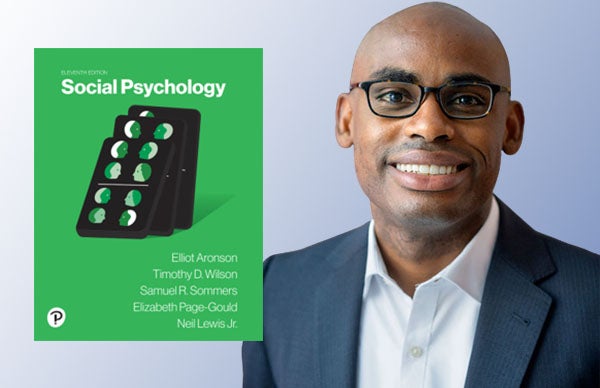Dr. Neil A. Lewis, Jr. is an award-winning behavioral scientist, author, speaker, and Cornell professor who has devoted his career to studying how to motivate people and organizations to improve equity within themselves and throughout broader society. Dr. Lewis is a Nancy and Peter Meinig Family Investigator in the Life Sciences at Cornell University and Weill Cornell Medicine, where he is also an associate professor of communication, medicine, and public policy. His research examines how people’s social contexts and identities influence how they make sense of the world and how those meaning-making processes affect their motivation to pursue their life goals. Dr. Lewis uses his research to examine and address the consequences of social disparities, including racial, economic, and gender inequality.
An engaging and eloquent speaker, Dr. Neil A. Lewis Jr. is popular with companies interested in improving workplace culture and outcomes, government agencies interested in evidence-based policies, and universities interested in improving educational outcomes. Drawing on his research, he offers fascinating insights into the invisible social forces perpetuating inequality in organizations and many other areas of life and what they mean for creating more equitable outcomes. As co-founder and co-director of the Cornell Action Research Collaborative, he works with policymakers and organizations to develop initiatives and policies that reduce disparities in multiple domains, including education, health, and the environment.
Dr. Lewis has been recognized as one of the 30 up-and-coming thinkers by Thinkers50 and Deloitte. He has been awarded the National Academies Eric and Wendy Schmidt Award for Excellence in Science Communication, the Janet Taylor Spence Award for Transformative Early Career Contributions from the Association for Psychological Science, the SAGE Young Scholar Early Career Award from the Society for Personality and Social Psychology, and Cornell’s Research and Extension Award for Outstanding Accomplishments in Science and Public Policy. He is also an author of a textbook on Social Psychology, a contributor to The Atlantic, and his work has been featured in The Wall Street Journal and The Washington Post, among other publications.
Dr. Neil Lewis, Jr. earned his B.A. in Economics and Psychology at Cornell University and his M.S. and Ph.D. in Social Psychology at the University of Michigan.
Interested in bringing Dr. Neil Lewis Jr. to speak at your event or to your corporation or institution? Contact us for more information.
Topic
What We Learn from Where We Live: How Our Surroundings Affect Our Thoughts, Feelings, and Behaviors
People and organizations are often interested in creating change. They want to improve student outcomes in schools, improve health and well-being, improve sustainability goals, and improve intergroup relations. Despite grand aspirations to change important outcomes—changing people and institutions to achieve big goals is notoriously difficult. This talk covers why that is, and what can be done to create changes that last.
Moving Beyond Implicit Bias: Lasting Solutions for Improving Diversity, Equity and Inclusion in Organizations
Implicit bias training has become one of the go-to tools for addressing a variety of intergroup relations ailments in organizations and society. Unfortunately, the research literature has documented that the effects of training are fleeting—they fade after approximately 24 hours. This does not mean that all hope is lost for organizations aiming to improve diversity, equity, and inclusion outcomes; there are a variety of other strategies that can be deployed to create lasting change. This talk covers those strategies, and how to implement and evaluate them.
Customized Talks: In addition to these talks, Dr. Lewis is open to creating customized talks for organizations that meet their specific needs (as long as those needs are within his areas of expertise). He has conducted research on:
- Criminal Justice
- Diversity, Equity, and Inclusion
- Education
- Environmental Sustainability
- Health
- Identity
- Motivation
- Organizational Behavior
- Savings Behavior
- Strategic Messaging
- Survey Methodology
- Quantitative Methodology
